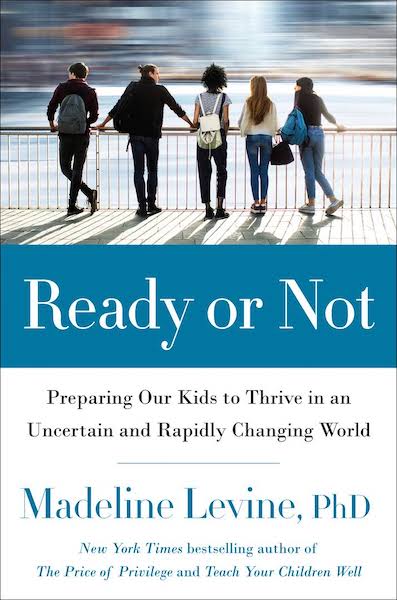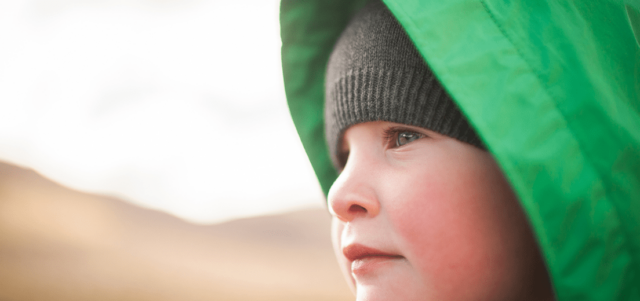Equipping our kids to thrive in a very uncertain, fast-changing future means recognizing that the only skill we absolutely know they will need is the ability to adapt. Lifelong learning will be the key to job security. Lifelong learning involves capabilities such as flexibility, curiosity, tolerance for failure and collaboration.
Raising Resilient Kids Who Are Prepared for the Future
Why adaptability, tolerance for failure and other so-called "soft skills" are important for success
Clinical Expert: Madeline Levine, PhD
en EspañolThis is an except from Ready or Not: Preparing Our Kids to Thrive in an Uncertain World, by Madeline Levine, PhD.
Many parents I meet are alarmed and unsure about how to enable their children to succeed in a future that will bear little resemblance to the world in which we made our way. Facing uncertainty can make us anxious, and we pass that anxiety on to our kids.
We overprotect and overdirect our children, turning our kids into risk-averse rule-followers. Yet that’s exactly the opposite of the mindset they’ll need if, as experts from multiple fields agree, adaptability, curiosity, risk-taking and flexibility will be the survival skills of tomorrow.
 We reward young scholars for memorizing all the right answers, but in a rapidly evolving world it will be more important to ask incisive questions. Why? Because content is available with the swipe of a finger. What to do with that content, how to evaluate it and stitch it together with other content in new and important ways, is what will matter.
We reward young scholars for memorizing all the right answers, but in a rapidly evolving world it will be more important to ask incisive questions. Why? Because content is available with the swipe of a finger. What to do with that content, how to evaluate it and stitch it together with other content in new and important ways, is what will matter.
Students are encouraged to compete for awards, trophies and a few slots at top universities, but in the coming years a talent for collaboration will be far more valuable than a habit of ruthless competition. Time and again, I see well-intentioned parents reflexively pushing their children toward metric success, unintentionally crowding out curiosity, creativity and flexibility. These need not be either/or propositions. A healthy balance would serve most kids far better than a singular preoccupation.
Cultivating resilience over time
As we ponder how we can communicate less anxiety to our children, it’s worth reminding ourselves that parenting has a long trajectory.
We tend to think that every moment, decision, success and failure is critical, but what’s critical over time is that our children become loyal friends, good partners, honest and reliable workers, have a strong moral center and develop other worthy attributes. Our goal as parents is to be courageous enough to give our kids the time and opportunities they need to cultivate these qualities, and to model them ourselves.
We also need to accept that our children’s sense of accomplishment and self-worth will wax and wane along with their successes. One of my young patients was a star basketball player in middle school, confident and popular among his classmates. In high school he was placed on the junior varsity team and didn’t do particularly well. He went from being poised and positive to feeling insecure and gloomy for several months (which is when his startled mother brought him to see me).
We explored his other interests and talents, and he decided to join a rugby team. As he became more competent, his confidence increased and he went back to being his “normal kick-ass self,” as he put it. The human learning curve is full of dips and plateaus, as we all remember. We do our kids a favor when we acknowledge this.
Think of your child’s growing up as a movie, not as a snapshot. What looks critical at one moment often becomes incidental over the course of time. Love, support, curiosity, an emphasis on “doing the right thing” and the ability to tolerate our children’s missteps and disappointments are what matter most.
When we shield children from failure or choreograph successes for them, we’re distorting the experiences they need in order to grow. In contrast to the basketball player whose parents didn’t interfere with his struggle, I can think of many kids whose parents have interfered and unintentionally placed roadblocks in the way.
Showing kids that we trust them
I’m seeing a patient who’s gone through the first two years of college without going to class or writing a paper on her own. A paid tutor does it for her. I hesitated to include this example in the book, thinking it was too extreme. However, I mentioned it to a colleague and he countered with a story about a young man who completed all four years of university the same way. When he confronted the student’s mother about it, she said, “You don’t expect me to allow some grades to get in the way of his success, do you?”
I’m not suggesting we banish tutors from the educational landscape. They can guide students through facets of subjects that are particularly hard for them or through courses that are a punishing but unavoidable part of the core curricula. Hiring a tutor also shows kids that needing help isn’t shameful; in fact, it’s wise to know when to ask for it. If a child or teenager has learning disabilities, tutors can teach workarounds and how to study more effectively. But hiring a tutor can also send the message I’m afraid you’re not smart enough.
A fearful family is one in which the parents don’t trust their children’s intelligence, competence or common sense. They don’t trust the world to deliver the kind of advantages they feel are necessary for survival. They don’t trust teachers or the system; they need to place a finger on the scale because they’re afraid that whatever is required of their child, he or she won’t measure up. It’s a searing and destructive vote of no confidence.
As much money and effort as it takes to manipulate children’s successes in this way, we do it because it gives us the illusion of control. It’s a lot harder to hand appropriate control to our kids.
The greater our inner reserves, the more tolerance we’ll have for all the sources of anxiety in our lives and in our children’s lives, and the more effective we’ll be at managing and modeling an approach to life that is dictated by thoughtful choices and not reflexive anxiety.
When we’re with our kids, it’s understandable to react anxiously to their anxiety. Understandable — but not beneficial. Kids worry about a lot of things: Will I have someone to eat lunch with? Will Kara still be my friend today? Will Clayton text me back? Will I be picked for the team? These concerns reflect normal phases of social development and aren’t cause for alarm. To keep the atmosphere calm for our children and ourselves, we can reframe anxiety-provoking situations as opportunities:
“I might not get picked for the team!”
“I know you’d really like to get picked for the team, but if you don’t it will give you more time. What would you like to use it for?”
Or:
“I know you’ll feel bad if you don’t get picked, but you can handle it.”
Those words — You may feel bad but you can handle it — signal not only our faith in our child’s abilities but also that we can handle it if they feel bad.
Why soft skills aren’t “soft”
If we’re serious about equipping our kids to thrive in a very uncertain, accelerated future, the only skill we absolutely know they will need is the ability to adapt. Lifelong learning will be the key to job security. In addition to hard skills in an individual’s particular field — for instance biology, economics, or the law — lifelong learning involves capabilities such as flexibility, curiosity, tolerance for failure and collaboration. These skills are of critical importance, require effort and intelligence, are amenable to teaching, and just as challenging to master as hard skills. By any measure, “soft” is a misnomer for these skills.
We do our kids a disservice when we insist on one more AP course instead of encouraging work at the animal rescue center. The skills critical to our children’s future success can be cultivated within almost any context, but they’ll stick better if it’s a context your child actually enjoys.
If we can take the giant leap of faith our era requires and devote less attention to resumé fodder, we can help our children develop traits like inventiveness, tolerance for failure, risk-taking, collaboration and bravery.
I once sat on a panel where the audience consisted of hard-charging, high-achieving parents. One dad was deeply concerned about the amount of time his son spent playing guitar. I was uneasy with the audience suggestions: Take the guitar away for a few weeks. Strictly limit practice time. Allow access to the guitar based on the kid’s most recent grades.
I checked in with James Hetfield, lead singer of the band Metallica, about these responses.
“How about having his parents tell him to start a band?” James interjected.
The boy could have cultivated a raft of valuable skills — creativity, perseverance, collaboration, risk taking — by forming and playing in a band, and maybe he’d even have developed some entrepreneurial chops as well. All while doing something that he genuinely loved, was motivated by and engaged in. I know it’s common to talk about thinking “inside the box” and “outside the box.” Years of clinical practice and a notably creative child of my own has taught me that sometimes it’s best not to have a box at all.
For more on raising resilient children, see Ready or Not: Preparing Our Kids to Thrive in an Uncertain World. Madeline Levine, PhD, is a clinician, consultant, educator and speaker, and the author of two other books: The Price of Privilege and Teach Your Children Well.
Frequently Asked Questions
Think of your child’s growing up as a movie, not a snapshot. What looks critical at one moment often becomes incidental over time. Love, support, curiosity, an emphasis on “doing the right thing” and the ability to tolerate missteps and disappointments are what matter most. Don’t shield children from failure but help them learn from it.
Parents should avoid overprotecting and overdirecting children, which can turn kids into risk-averse rule-followers. Experts from multiple fields agree that adaptability, curiosity, risk-taking and flexibility will be the survival skills of tomorrow.
Learn more about our Family Resource Center and our editorial mission.
Was this article helpful?
Related Reading
-
 Complete Guide to Managing Behavior Problems
When children struggle with their behavior, it can have a negative impact on everyone in…
Complete Guide to Managing Behavior Problems
When children struggle with their behavior, it can have a negative impact on everyone in…
-
 Metacognition: How Thinking About Thinking Can Help Kids
A powerful skill for building resilience
Metacognition: How Thinking About Thinking Can Help Kids
A powerful skill for building resilience
-
 How to Help Kids Who Are Lonely
What parents can say to kids who are struggling socially and how they can help
How to Help Kids Who Are Lonely
What parents can say to kids who are struggling socially and how they can help
-
 Helping Children Cope After a Traumatic Event
Tips for supporting children with trauma
Helping Children Cope After a Traumatic Event
Tips for supporting children with trauma
-
 Summer and Sensory Processing Issues
How to help kids stay comfortable in what can be overstimulating outdoor activities
Summer and Sensory Processing Issues
How to help kids stay comfortable in what can be overstimulating outdoor activities
-
 Social Challenges of Kids With Learning Problems
Learning problems can affect not just school but communicating and connecting with other kids.
Social Challenges of Kids With Learning Problems
Learning problems can affect not just school but communicating and connecting with other kids.
-
 ADHD and Behavior Problems
Why are tantrums, outbursts and defiance so common in kids with the disorder? And how…
ADHD and Behavior Problems
Why are tantrums, outbursts and defiance so common in kids with the disorder? And how…
-
 Supporting Trans and Nonbinary Kids at School
Why gender affirmation at school matters, and how families can help
Supporting Trans and Nonbinary Kids at School
Why gender affirmation at school matters, and how families can help








